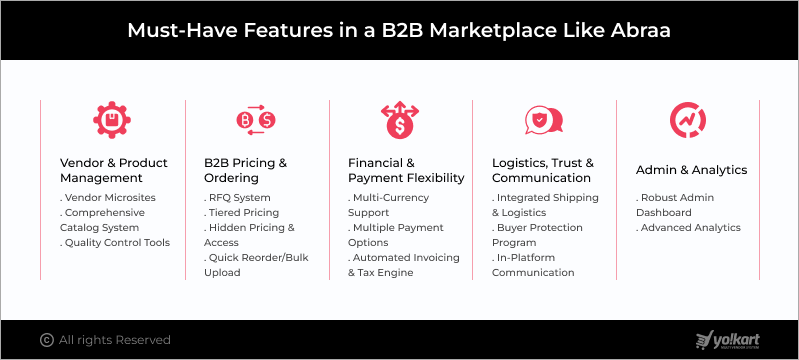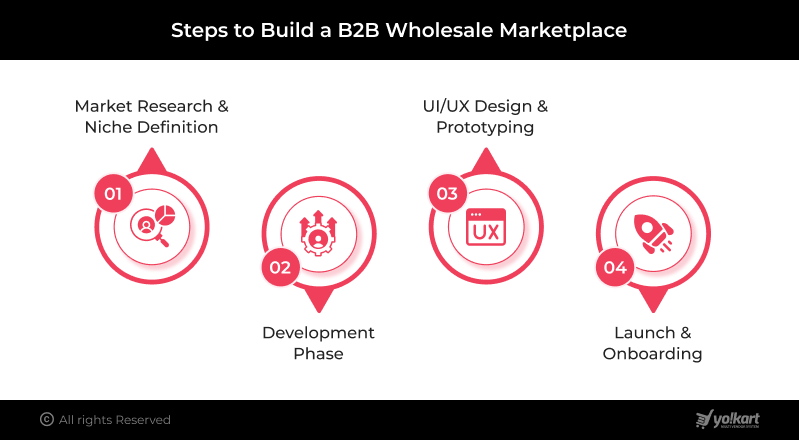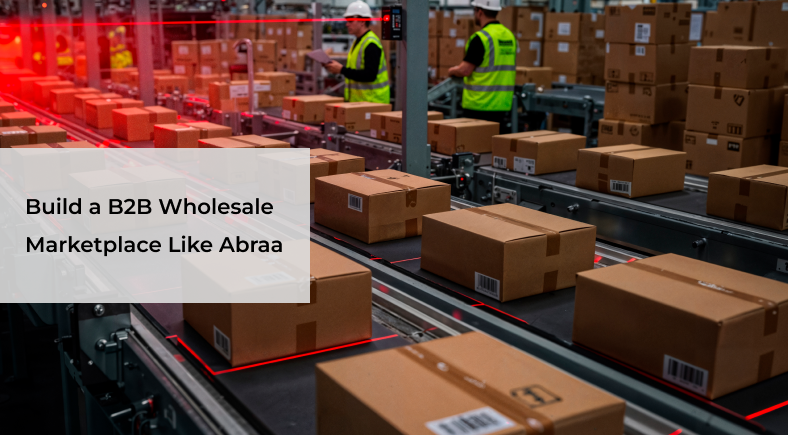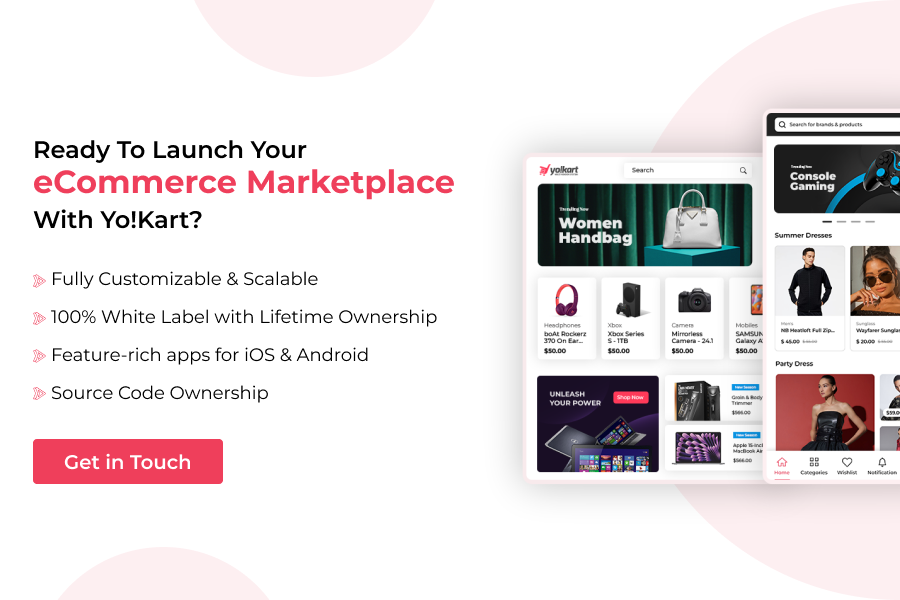The business-to-business (B2B) landscape is undergoing a profound digital transformation. Once dominated by analog methods, the wholesale industry is rapidly shifting to online platforms, streamlining supply chains and unlocking global opportunities. At the forefront of this evolution are sophisticated B2B wholesale marketplaces, which are establishing new standards for efficiency and scale.
According to a report by Grand View Research, the global B2B eCommerce market size is projected to reach $57,578.97 billion by 2030, growing at a CAGR of 18.2% from 2024 to 2030. Moreover, the success of Middle East and North Africa (MENA) powerhouses like Abraa has clearly demonstrated the immense potential of connecting global suppliers, manufacturers, and buyers on a single, feature-rich B2B platform. If you’re looking to capitalize on this trillion-dollar industry, understanding the blueprint for creating a B2B wholesale marketplace, with the right B2B Marketplace Solution, is the first critical step.
This blog delves into the core mechanics of Abraa’s business model, winning formula, outlines the essential features, and provides a comprehensive roadmap for development, ultimately recommending the most strategic approach to launch your own dominant B2B Marketplace Platform.
Table of Contents
- What is a B2B Marketplace?
- Key Difference Between a B2B and B2C eCommerce Marketplace
- Understanding Abraa: A Model of Regional Dominance
- Must-Have Features in a B2B Marketplace Like Abraa
- Steps to Build a B2B Wholesale Marketplace
- The Best Approach to Build B2B Marketplace : Choose Self-Hosted Solution
- Conclusion
- FAQs
What is a B2B Marketplace?
A B2B Marketplace is an online platform that is exclusively designed for commercial transactions between businesses. Unlike a B2C (Business-to-Consumer) marketplace, which focuses on small, individual purchases, a B2B platform facilitates:
- Bulk Ordering: The core function revolves around large minimum order quantities (MOQs) and high-value transactions.
- Wholesale Pricing: Pricing is often tiered, volume-based, and personalized for specific business accounts. Prices may even be hidden and only visible to registered, verified business buyers.
- Complex Logistics: It handles more intricate shipping, payment, and logistics processes, often involving freight, customs, and international compliance.
- Long-Term Relationships: The emphasis is on building long-term, repeatable contracts and supply chain partnerships, rather than one-time sales.
In essence, a B2B wholesale marketplace acts as a digital procurement hub, replacing traditional trade shows and manual sales processes with an efficient, transparent, and scalable online environment.
Turn Your B2B Wholesale Marketplace Vision into Reality
Key Difference Between a B2B and B2C eCommerce Marketplace
While both B2B and B2C marketplaces are digital platforms for buying and selling, they fundamentally differ in their target audience, transactional nature, and operational requirements. Understanding these distinctions is crucial for designing a successful B2B platform.
| Feature | B2B (Business-to-Business) Marketplace | B2C (Business-to-Consumer) Marketplace |
| Buyer Profile | Professional procurement managers, resellers, or manufacturers. | Individual end-consumers. |
| Order Volume | High-volume/Bulk orders with Minimum Order Quantities (MOQs). | Low-volume, typically single-item or small-batch purchases. |
| Pricing | Negotiated, tiered, and customized (often hidden or accessible only via RFQ). | Fixed, visible retail prices with occasional seasonal discounts. |
| Payment Terms | Complex options including Net 30/60, bank transfers, and Letters of Credit (LCs). | Immediate payment via credit /debit card, digital wallet, or COD. |
| Sales Cycle | Longer, more formal cycle involving quotes, contracts, and approvals. | Short, instant transaction cycle. |
| Logistics | Complex, requiring freight, customs, and a coordinated supply chain delivery. | Simple parcel shipping to residential addresses. |
Understanding Abraa: A Model of Regional Dominance
Founded in Dubai, Abraa has established itself as a leading B2B wholesale marketplace connecting businesses across the MENA region and beyond. Its success is rooted in a clear and compelling business model that specifically addresses the unique challenges of cross-border wholesale trade.
Abraa’s Business Model: The Multi-Sided Platform
Abraa operates on a multi-vendor, commission-based marketplace model with a strong focus on trust and logistics facilitation.
1. Connecting the Ecosystem: It attracts and rigorously evaluates a diverse range of suppliers (manufacturers, wholesalers, distributors) and buyers (retailers, resellers, other businesses) from various industries, including electronics, machinery, and industrial equipment.
2. Monetization through Commission: The primary revenue stream is a commission charged to the seller on every successful transaction conducted through the platform. This commission can vary based on the product category and the vendor’s subscription tier.
3. Value-Added Services (The Trust Factor): Crucially, Abraa adds significant value by mitigating the risks associated with international trade. These services often include:
- Secure Payment Options: Offering payment protection to buyers until goods are received and inspected.
- Product Inspection: Providing third-party services to ensure product quality matches the description before final payment is released.
- Logistics Facilitation: Assisting with complex cross-border shipping, customs clearance, and freight forwarding.
- Premium Subscriptions: Offering premium tiers to suppliers for enhanced visibility, lead generation tools, and higher sales volume.
By integrating these services, Abraa moves beyond being a mere directory to become a trusted, end-to-end B2B trading partner.
Ready to Replicate a Wholesale Marketplace Like Abraa
Must-Have Features in a B2B Marketplace Like Abraa
To replicate the success of a top-tier platform, your B2B Marketplace must have a specialized suite of features that cater to the distinct demands of wholesale commerce. Let’s explore some of the features:

1. Advanced Vendor & Product Management
- Vendor Microsites: Dedicated, customizable storefronts for each supplier to establish their brand and showcase their catalog.
- Comprehensive Catalog System: A powerful backend that allows for rich product descriptions, multi-tiered categories, product variations, and the ability to upload bulk product data (crucial for wholesalers).
- Quality Control Tools: Features for the admin to assess, approve, or reject vendor registrations and product listings to maintain the marketplace’s quality and trust.
2. Specialized B2B Pricing & Ordering
- Request for Quotation (RFQ) System: A mandatory feature allowing buyers to request custom pricing, terms, and MOQs from sellers, facilitating the negotiation that defines B2B trade.
- Tiered Pricing: The ability for vendors to set different price tiers based on order volume (e.g., 100 units at $5 each, 500 units at $4.50 each).
- Hidden Pricing & Controlled Access: Restricting product pricing and catalog visibility only to registered and verified business buyers.
- Quick Reorder/Bulk Upload: Enabling buyers to easily upload a list of SKUs and quantities for quick, large-scale reorders.
3. Financial & Payment Flexibility
- Multi-Currency Support: Essential for global trade, allowing transactions in different currencies with real-time conversion display.
- Multiple Payment Options: Support for traditional methods like wire transfers and Letters of Credit (LCs), alongside modern options like corporate credit cards and secure payment escrow services.
- Automated Invoicing & Tax Engine: Seamless generation of tax-compliant invoices, factoring in multi-tier taxation, VAT, and international tax laws.
4. Logistics, Trust & Communication
- Integrated Shipping & Logistics: Seamless API integrations with major shipping carriers and freight forwarders, allowing for real-time rate calculation and shipment tracking for bulk orders.
- Buyer Protection Program: An escrow-like function that holds payments until the buyer confirms satisfactory delivery, mirroring Abraa’s trust mechanism.
- In-Platform Communication: Built-in messaging or chat functionality to facilitate direct, secure negotiation between buyers and sellers regarding quotes and terms.
5. Admin & Analytics
- Robust Admin Dashboard: A single, centralized control panel for managing vendors, commissions, payments, disputes, and marketplace settings.
- Advanced Analytics: Real-time reporting on key B2B metrics, such as Gross Merchandise Value (GMV), vendor performance, buyer behavior, and conversion rates for RFQs.
Ready to Build a Feature-Rich Wholesale Marketplace
Steps to Build a B2B Wholesale Marketplace
The process to build a B2B marketplace and bring a complex B2B marketplace platform to life can be broken down into five critical phases.

Step 1: Market Research and Niche Definition
Before building your B2B marketplace, you must conduct market research and define your Unique Value Proposition (UVP). Effective market research combines qualitative approaches like in-depth interviews and focus groups with quantitative methods such as surveys and data analytics to gather actionable insights on industry trends, customer pain points, and buying behaviors. This comprehensive understanding enables you to identify:
- Target Niche: First thing that you must decide is on what specific industry (e.g., industrial chemicals, specialized auto parts, MENA-region textiles) you will focus on? Moreover, defining a niche often leads to faster early traction.
- Business Model: After deciding on the niche, confirm your business model/ monetization strategy, which can include various income generation channels such as commission, subscription, listing fees, in-app promotion, or much more.
- User Personas: Define the needs of your ideal buyer (procurement manager) and seller (wholesaler/manufacturer) to ensure your platform effectively addresses their unique requirements. Additionally, understanding these personas enables you to design tailored features and user experiences that facilitate seamless interactions, support negotiation workflows, and provide robust account management.
Step 2: Platform Strategy and Technology Selection (Development Phase)
In this rapidly evolving digital landscape, selecting the right approach to build your wholesale platform is the most critical decision and the core of your investment. This will not only determine the cost but operational efficiency of your platform. You can develop your B2B Marketplace platform using various approaches; however, let’s explore three popular ones below:
A. Custom Development (Building from Scratch)
- This approach includes hiring an in-house team or a software development agency to write every line of code specifically for your platform from the ground up.
- Pros: Complete control over functionality, design, and scalability; perfect alignment with unique business logic.
- Cons: Highest cost (typically $150,000+), longest development timeline (6-12+ months), and high risk (the platform must be maintained and updated exclusively by you), requires a technical team to fix unexpected technical issues and bugs.
- Best For: Companies with massive, complex needs, unlimited budgets, and a long timeline (e.g., an established industry giant).
B. Ready-made SaaS (Software-as-a-Service)
This approach allows you to rent a pre-built, cloud-hosted platform (like Shopify Plus with marketplace add-ons). However, you need to pay a monthly subscription fee.
- Pros: Low upfront cost, fastest time-to-market (weeks), zero maintenance responsibility.
- Cons: Limited customization; you don’t own the source code, which creates vendor lock-in; recurring subscription fees can become very expensive as you scale.
- Best For: Startups testing an unproven concept with a minimal budget, requiring rapid deployment.
C. Ready-made Self-Hosted Solution (License Purchase)
Leveraging this solution, you can purchase a pre-built, complete B2B Marketplace Solution and install it on your own server. Moreover, you own the software license and the source code.
- Pros: Significant cost savings and fast launch compared to custom development; 100% source code ownership provides full control and deep customization capability; No recurring transaction fees; Market-tested solution.
- Cons: Requires your own hosting server.
- Best For: Ambitious, scalable ventures like Abraa, which require full ownership, deep customization, and high-security standards without the long-term burden of subscription fees.
Step 3: UI/UX Design and Prototyping
Effective and intuitive UI/UX design is crucial to user adoption and satisfaction in B2B marketplaces. Moreover, designing intuitive, role-based interfaces tailored for Admins, Vendors, and Buyers ensures that all user groups can navigate and operate the platform efficiently. Additionally, focus on:
- Clear product filtering and advanced search by specifications.
- An efficient, friction-free RFQ and negotiation interface.
- User-friendly dashboards for managing inventory, orders, and finances.
Step 4: Launch and Ecosystem Onboarding
A marketplace is useless without participants. Thus, post-development, the focus shifts to attracting and onboarding both vendors and buyers to create real value. Thus, you must:
- Seed the Supply: Focus aggressively on onboarding a high-quality initial cohort of vendors and a comprehensive product catalog.
- Attract the Demand: Use targeted marketing (SEO, PPC, trade show presence) to bring in the first batch of verified business buyers.
- Iterate: Launch the Minimum Viable Product (MVP), gather user feedback, and continuously update the platform based on real-world usage.
The Best Approach to Build B2B Marketplace : Choose Self-Hosted Solution
For a scalable, professional, and high-control B2B Marketplace Platform like Abraa, the Ready-made Self-Hosted Solution provides the optimal balance of speed, cost-effectiveness, and ultimate control. This approach leverages existing, industry-tested software while granting you the freedom to customize and scale infinitely.
A leading example in this category is Yo!Kart. It is a multi-vendor ecommerce marketplace solution that is highly customizable and scalable for businesses, including retail, B2B, digital products, liquor, and more. It supports multi-currency and multilingual functionalities, backed by an advanced product catalog and a powerful search system to enhance user experience. Further, this robust solution includes real-time analytics, smart product recommendations, and over 20 pre-integrated payment gateways.
Why Yo!Kart is a Preferred Self-Hosted Solution:
1. Lifetime Ownership & Source Code: With a one-time purchase, you receive a lifetime license and 100% ownership of the source code. This eliminates recurring subscription fees and the threat of vendor lock-in, giving you a valuable, proprietary asset.
2. Built for B2B: Unlike many platforms adapted from B2C models, Yo!Kart is engineered from the ground up to support critical B2B features like the Request for Quotation (RFQ) module, tiered pricing, bulk ordering, and separate buyer/seller dashboards.
3. High Scalability: It is architected to handle large product catalogs, high traffic volumes, and a growing number of vendors and transactions, a non-negotiable requirement for an international wholesale marketplace.
4. Complete Customization: Full source code access means that while you launch quickly with a ready-to-use solution, you retain the ability to fully tailor every feature, design element, and integration to match your unique industry requirements, effectively bridging the gap between a quick-launch solution and a fully custom build.
By choosing a robust, self-hosted B2B Marketplace software like Yo!Kart, you are investing in a future-proof foundation that allows you to focus on the business, onboarding high-value vendors, and attracting verified buyers, rather than reinventing the entire technical wheel.
Schedule a One-on-One Demo Session to Know More About Yo!Kart
Conclusion
Building a successful B2B wholesale marketplace platform akin to Abraa is not merely a technical challenge but a strategic exercise in trust-building, logistics management, and digital transformation. It requires a dedicated focus on the distinct needs of business buyers, particularly in facilitating bulk orders, custom pricing, and secure, cross-border transactions.
By selecting a powerful and flexible B2B Marketplace Solution, ideally a self-hosted platform that provides full source code ownership, you can accelerate your launch, drastically reduce long-term costs, and retain the comprehensive control necessary to scale your platform into a dominant force in the global wholesale economy. The opportunity to digitize the global supply chain is vast, and with the right platform strategy, your B2B marketplace can be the next major hub for commerce.
Frequently Asked Questions (FAQs)
Q 1. What is the main difference between a B2B and a B2C marketplace model?
Ans. The primary difference lies in transaction volume and relationship.
- B2B (Business-to-Business) focuses on large, bulk orders, negotiated pricing (often via RFQ), high order value, and long-term contractual relationships. Moreover, B2B platforms require specialized features for tax, logistics, and account-based management.
- B2C (Business-to-Consumer) focuses on small, individual orders, fixed retail pricing, and single-transaction customer relationships.
Q 2. What is “vendor lock-in” in the context of Whitelabel B2B Marketplace Software?
Ans. Vendor lock-in occurs with SaaS (Software-as-a-Service) solutions. It means you are entirely dependent on the software provider and their subscription model. You do not own the code, and if you stop paying the monthly fee or the provider goes out of business, your marketplace ceases to exist. On the other hand, a self-hosted solution eliminates this risk by giving you 100% source code ownership.
Q 3. Is the Request for Quotation (RFQ) feature essential for a wholesale marketplace?
Ans. Yes, the RFQ system is arguably the most essential B2B feature. Wholesale transactions are rarely fixed-price; they involve negotiation based on quantity, delivery terms, and custom specifications. An RFQ system provides the digital framework for buyers to request custom prices and for vendors to submit tailored bids, formalizing the core negotiation process of B2B trade.
Q 4. How much does it cost to build a B2B marketplace like Abraa?
Ans. Costs vary significantly based on the development approach:
- Custom Development: $50,000 to $100,000+ with ongoing maintenance.
- Ready-made SaaS: Low upfront cost (e.g., $500-$2,000/month) but high recurring costs that scale with your business volume and include transaction fees. Moreover, it offers limited customization and charges an additional fee for advanced feature integration.
- Self-Hosted Solution (e.g., Yo!Kart): A one-time license purchase ranging from 999 USD to 6499 USD, offering a strong feature set with full ownership. This is often the most cost-effective path for high-growth ventures.
Explore the packages offered by Yo!Kart
Q 5. What are the key revenue streams for a B2B wholesale marketplace?
Ans. The primary revenue streams typically include:
1. Commission: A percentage charged on every successful seller transaction.
2. Subscription/Membership Fees: Charging sellers (and sometimes buyers) a monthly/annual fee for premium tools, higher visibility, or access to the platform.
3. Advertising/Featured Listings: Allowing vendors to pay for prime product placements or banner ads on the site.
4. Value-Added Services: Charging for services like logistics coordination, payment protection (escrow), and third-party product inspection.




